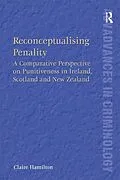Although developments such as the drastic increase in the use of imprisonment and restrictions on parole suggest a new, harsher punitive era, Hamilton's empirical data based on examination of penal policies in Ireland, Scotland and New Zealand, suggests criminal justice and penal policies vary. This study is critical of the way in which punitiveness is currently measured by leading criminologists and demonstrates the utility of viewing criminal justice from the perspective of smaller jurisdictions.
Autorentext
Dr Claire Hamilton LLB. (Ling. Franc.); Barrister-at-Law; M.Litt; Dip EurCon in Human Rights; Diploma in Third Level Learning and Teaching practised as a barrister in criminal law until 2004 when she became a full time academic. She is currently a Lecturer in Criminology in the School of Sociology, Social Policy and Social Work in Queen's University Belfast.
Zusammenfassung
Drastic increases in the use of imprisonment; the introduction of 'three strikes' laws and mandatory sentences; restrictions on parole - all of these developments appear to signify a new, harsher era or 'punitive turn'. Yet these features of criminal justice are not universally present in all Western countries. Drawing on empirical data, Hamilton examines the prevalence of harsher penal policies in Ireland, Scotland and New Zealand, thereby demonstrating the utility of viewing criminal justice from the perspective of smaller jurisdictions. This highly innovative book is thoroughly critical of the way in which punitiveness is currently measured by leading criminologists. It is essential reading for students and scholars of criminology, penology, criminal justice and socio-legal studies, as well as criminal lawyers and practitioners.
Inhalt
Reconceptualising Penality
